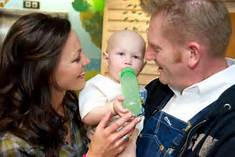Rory Feek, one half of the Grammy-winning country duo Joey + Rory, announced last week that he will perform publicly for the first time since his wife Joey died last year to raise funds for the Music Health Alliance, a nonprofit that helped his family with insurance and medical bills.
The Academy of Country Music-winning duo stopped performing when Joey’s cancer returned in 2015, although the couple recorded a gospel album in between her chemotherapy treatments. The album, “Hymns,” won best gospel roots album this year at the Grammys. Joey died on March 4, 2016, at the age of 40.
Feek said during a press conference for the Music Health Alliance that he had been thinking about performing again to celebrate his wife’s birthday in September. The two started their careers separately with Rory Feek pursuing songwriting and Joey Feek trying to make it as a singer, but gained popularity as a duo competing on the Country Music Television singing competition “Can You Duet?” in 2008.
He’ll perform at a barn at his home in rural Pottsville, Tennessee on Sept. 8 and 9, where the two used to perform together. The couple gained national attention through Rory Feek’s blog as he documented their faith and the strength of his wife as they decided to stop her treatment.
“I should get onstage and see what’s there,” Feek said. “What’s in store? What would I say if I were up there by myself? For me it will be good because I will learn why I am supposed to be there and what the future holds.”
Music Health Alliance is asking the music community to donate 5 percent of their earnings for one day to help assist others with medical needs and the city declared Oct. 20 as Heal the Music Day. The nonprofit, based in Nashville, helps those employed in the music industry find doctors, sign up for health insurance and navigate policies. The  nonprofit estimates that more than 75 percent of the 56,000 people in Nashville are self-employed or do not have access to group health insurance.
nonprofit estimates that more than 75 percent of the 56,000 people in Nashville are self-employed or do not have access to group health insurance.
Feek said he first reached out to the Music Health Alliance after his wife’s cancer returned and she wanted to seek treatment at a facility that was considered out of network under their health insurance. Feek said the nonprofit helped them with the problem.
“It was a blessing, because if you don’t make it through cancer or if you do, you at least would like to feel good about the choices you made,” Feek said.
NASHVILLE, Tenn. (AP)






